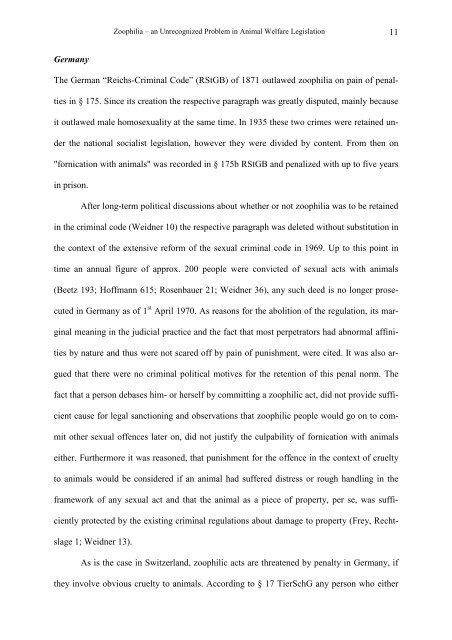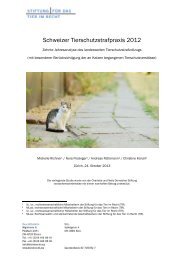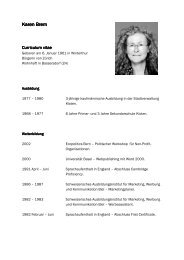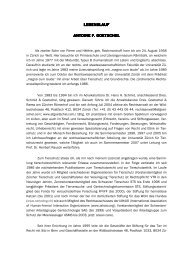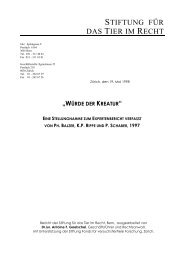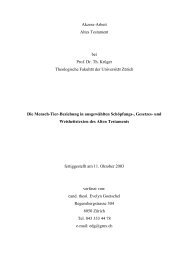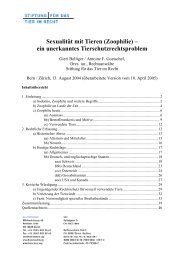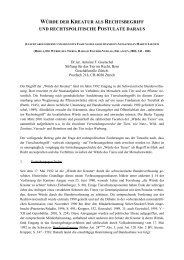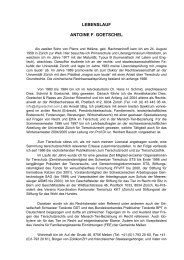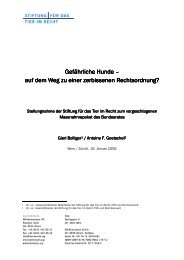Zoophilia an Unrecognized Problem in Animal Welfare Legislation
Zoophilia an Unrecognized Problem in Animal Welfare Legislation
Zoophilia an Unrecognized Problem in Animal Welfare Legislation
Create successful ePaper yourself
Turn your PDF publications into a flip-book with our unique Google optimized e-Paper software.
Germ<strong>an</strong>y<br />
<strong>Zoophilia</strong> – <strong>an</strong> <strong>Unrecognized</strong> <strong>Problem</strong> <strong>in</strong> <strong>Animal</strong> <strong>Welfare</strong> <strong>Legislation</strong><br />
The Germ<strong>an</strong> “Reichs-Crim<strong>in</strong>al Code” (RStGB) of 1871 outlawed zoophilia on pa<strong>in</strong> of penal-<br />
ties <strong>in</strong> § 175. S<strong>in</strong>ce its creation the respective paragraph was greatly disputed, ma<strong>in</strong>ly because<br />
it outlawed male homosexuality at the same time. In 1935 these two crimes were reta<strong>in</strong>ed un-<br />
der the national socialist legislation, however they were divided by content. From then on<br />
"fornication with <strong>an</strong>imals" was recorded <strong>in</strong> § 175b RStGB <strong>an</strong>d penalized with up to five years<br />
<strong>in</strong> prison.<br />
After long-term political discussions about whether or not zoophilia was to be reta<strong>in</strong>ed<br />
<strong>in</strong> the crim<strong>in</strong>al code (Weidner 10) the respective paragraph was deleted without substitution <strong>in</strong><br />
the context of the extensive reform of the sexual crim<strong>in</strong>al code <strong>in</strong> 1969. Up to this po<strong>in</strong>t <strong>in</strong><br />
time <strong>an</strong> <strong>an</strong>nual figure of approx. 200 people were convicted of sexual acts with <strong>an</strong>imals<br />
(Beetz 193; Hoffm<strong>an</strong>n 615; Rosenbauer 21; Weidner 36), <strong>an</strong>y such deed is no longer prose-<br />
cuted <strong>in</strong> Germ<strong>an</strong>y as of 1 st April 1970. As reasons for the abolition of the regulation, its mar-<br />
g<strong>in</strong>al me<strong>an</strong><strong>in</strong>g <strong>in</strong> the judicial practice <strong>an</strong>d the fact that most perpetrators had abnormal aff<strong>in</strong>i-<br />
ties by nature <strong>an</strong>d thus were not scared off by pa<strong>in</strong> of punishment, were cited. It was also ar-<br />
gued that there were no crim<strong>in</strong>al political motives for the retention of this penal norm. The<br />
fact that a person debases him- or herself by committ<strong>in</strong>g a zoophilic act, did not provide suffi-<br />
cient cause for legal s<strong>an</strong>ction<strong>in</strong>g <strong>an</strong>d observations that zoophilic people would go on to com-<br />
mit other sexual offences later on, did not justify the culpability of fornication with <strong>an</strong>imals<br />
either. Furthermore it was reasoned, that punishment for the offence <strong>in</strong> the context of cruelty<br />
to <strong>an</strong>imals would be considered if <strong>an</strong> <strong>an</strong>imal had suffered distress or rough h<strong>an</strong>dl<strong>in</strong>g <strong>in</strong> the<br />
framework of <strong>an</strong>y sexual act <strong>an</strong>d that the <strong>an</strong>imal as a piece of property, per se, was suffi-<br />
ciently protected by the exist<strong>in</strong>g crim<strong>in</strong>al regulations about damage to property (Frey, Recht-<br />
slage 1; Weidner 13).<br />
As is the case <strong>in</strong> Switzerl<strong>an</strong>d, zoophilic acts are threatened by penalty <strong>in</strong> Germ<strong>an</strong>y, if<br />
they <strong>in</strong>volve obvious cruelty to <strong>an</strong>imals. Accord<strong>in</strong>g to § 17 TierSchG <strong>an</strong>y person who either<br />
11


